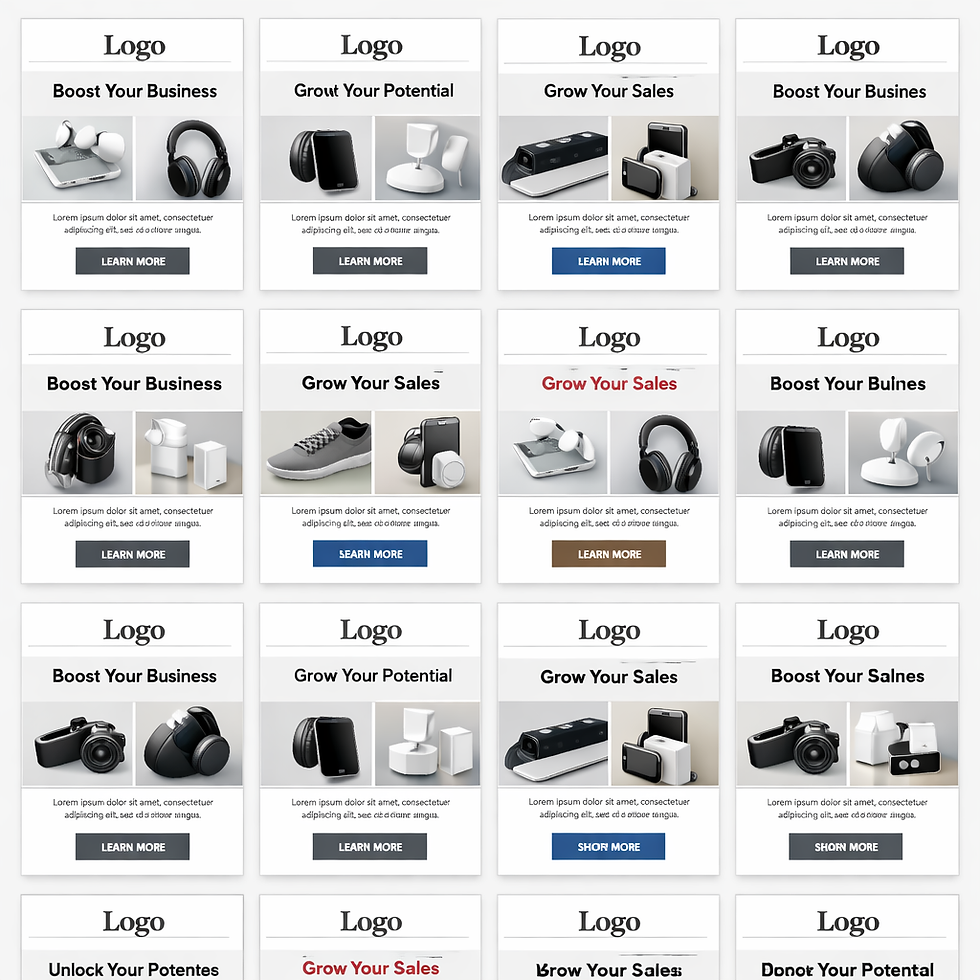What Tech Giants Get Wrong About You: Why Marketing Data Audits are Important
- Jennifer Leonard
- Jun 10, 2025
- 4 min read
Updated: Jun 23, 2025

Two years ago, I got my husband a smart speaker. I'm not sure what I was thinking, since he's not the most tech-forward person. He doesn't use 99% of the features like controlling the lights or thermostat, listening to music, or customizing settings so that when you say "Good Morning," it turns on the lights and tells you the weather.
Instead, it sits in our living room acting as an expensive digital photo frame and clock. He turned off the mic and camera, saying, "I don't want it listening to me and collecting information."
I think his concern is valid and probably very common. People assume smart speakers and apps are always on, always listening, quietly collecting data behind the scenes where every word becomes a data point in a permanent behavioral file. It's that "Big Brother is watching" feeling.
But having worked on several large-scale teams at big tech companies, I've realized that while data collection is real, the truth isn't quite so… omniscient.
The Real Problem Isn’t Surveillance — It’s Dirty Marketing Data
Yes, when you talk to your device, your voice command is sent to the cloud where it's processed and might be stored, depending on your settings. But there's no always-on audio stream constantly being analyzed and archived. (I looked this up to try to calm my husband's fears. There are actually hardware-level mic shutoffs for exactly this reason.)
Companies do collect a lot of data: voice queries, activity history, app usage, and behavioral signals used to improve services and, yes, personalize ads. But the goal isn't to "spy." It's to optimize your experience. Whether you're okay with that often depends on whether the personalization actually feels helpful.
Here's what I've learned from working with major tech platforms on campaigns, content systems, and data strategy: their back-end systems are messier than you'd think. Siloed teams, inconsistent tagging, outdated fields, duplicated records. Many of the same issues you'd find in any mid-sized company.
The bigger the company, the bigger the red tape and blockers when trying to get data clean and organized in a way that's useful to both marketers and customers receiving personalization efforts.
It's kind of ironic. Companies may know a lot about us, but most of what they "know" is incomplete, mis-categorized, or just plain wrong.
We're not dealing with an all-seeing, all-knowing digital overlord. We're dealing with massive systems making fuzzy guesses based on noisy data. That's often why personalization efforts feel off. Irrelevant ads, repetitive song suggestions, or missed context in virtual assistant responses.
These aren't Orwellian signs. They're signs of dirty, misaligned, or misunderstood data.
What People Actually Want from Personalization
I'm actually okay with companies collecting my data if it leads to a better experience. I think most people are, too. We just want:
Better clarity around what's being collected and why
The ability to turn it off or delete it (control)
Data that actually makes our experience meaningfully better
Maybe instead of fearing data collection altogether, we should be demanding better data stewardship. Cleaner pipelines, smarter segmentation, and more responsible governance. That's the foundation of true personalization, and it's where most companies still have work to do.
Why Clean Data (Not Just Big Data) Gives You an Edge
If companies could get this right, it would be a true competitive advantage. I think companies don't put more concerted effort toward data quality because it requires some heavy lifting upfront, plus ongoing hygiene. Timelines for data audits depend on company size and current state of existing data and systems. In larger companies, there's definitely more red tape and need for cross-team buy-in. But it can be done. And, even large companies can start with a smaller (yet significant) segment of their business, and then scale.
The thought of performing a data audit may seem daunting, but it's the most important step toward smarter marketing, especially when you consider the possibilities of AI and ML integrated with your martech stack. Before you personalize, segment, or predict anything, you need to know what data you have, where it lives, and how reliable it is.
I get excited thinking about the possibilities of delivering amazing customer experiences. It can be hard for marketers to start conversations with data teams, so I've been obsessing over this challenge and developing a systematic approach.
Start Here: The First Step to Better Marketing Data
The foundation of any AI-ready marketing strategy isn’t tech—it’s clean, reliable data. That’s why the very first step in my framework is all about conducting a proper data audit.
To help you take that step, I’ve created two focused resources:
🔹 Get the Lite Overview Guide – Free Download. It's a quick preview of what a solid data audit involves—perfect if you’re exploring next steps and want a clear, approachable starting point. →
🔹Step 1 Implementation Guide – only $39. When you’re ready to get hands-on, this is your full toolkit for running a data audit from start to finish:
6 customizable worksheets
Sample timeline templates
Stakeholder communication guides
Real-world tips for navigating internal alignment
→ Coming soon: store setup in progress—sign up to get notified the moment it’s live. [Join the waitlist or sign up for updates]
What Comes After the Audit?
Once you’ve audited your data, the next question is: How do we make sense of it all — and actually use it?
That’s where Step 1.5 comes in. I’m currently putting the finishing touches on a new resource: The Marketing Data Dictionary Guide + Template — a practical toolkit to help you define, document, and align your most important data fields.
It’s designed to make collaboration with data teams easier and bring much-needed clarity to your martech stack.
→ Want early access? Sign up here to get notified when it drops.



Comments